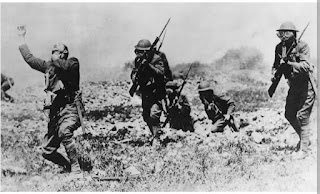Chemical weapon, any of several chemical compounds, usually toxic agents, that are intended to kill, injure, or incapacitate enemy personnel. In modern warfare, chemical weapons were first used in World War I (1914–18), during which gas warfare inflicted more than one million of the casualties suffered by combatants in that conflict and killed an estimated 90,000. In the years since then, chemical arms have been employed numerous times, most notably in the Iran-Iraq War (1980–88) and the Syrian Civil War.
The United States and the Soviet Union, during their decades of confrontation in the Cold War (1945–91), built up enormous stockpiles of chemical weapons. The end of the Cold War enabled those former adversaries to agree to ban all chemical weapons of the types that had been developed during World War I (first generation), World War II (second generation), and the Cold War (third generation).
Like nuclear weapons and biological weapons, chemical weapons are often classified as weapons of mass destruction. Under the Chemical Weapons Convention (CWC) of 1993, the use of chemical weapons in war is prohibited, as is all development, production, acquisition, stockpiling, and transfer of such weapons. Nevertheless, while the aim of the CWC is complete elimination of most types of chemical weapons, not all countries have abandoned their chemical warfare capabilities. In particular, some weaker states have pursued chemical weapons programs as deterrents to being attacked by enemies that have either stronger conventional forces or their own weapons of mass destruction, and some regimes have used chemical weapons to threaten especially vulnerable foes outside and even within their own borders.
Furthermore, some individuals and militant organizations have acquired or have sought to acquire chemical weapons in order to attack their enemies or to secure their own ends through terror. The continued threat from chemical weapons has led many states to prepare defenses against them and to exert diplomatic pressure on dissenting or noncompliant states to abide by the CWC.
Types of chemical weapons
Chemical weapons are chemical agents, whether gaseous, liquid, or solid, that are employed because of their direct toxic effects on humans, animals, and plants. They inflict damage when inhaled, absorbed through the skin, or ingested in food or drink. Chemical agents become weapons when they are placed into artillery shells, land mines, aerial bombs, missile warheads, mortar shells, grenades, spray tanks, or any other means of delivering the agents to designated targets.
Not all poisonous substances are considered suitable for weaponization, or use as chemical weapons. Thousands of such chemical compounds exist, but only a few dozen have been used as chemical warfare agents since 1900. The compounds of most utility must be highly toxic but not too difficult to handle. Furthermore, the chemical must be able to withstand the heat developed when delivered in a bursting shell, bomb, mine, or warhead. Finally, it must be resistant to water and oxygen in the atmosphere in order to be effective when dispersed.
Chemical agents
Since World War I, several types of chemical agents have been developed into weapons. These include choking agents, blister agents, blood agents, nerve agents, incapacitants, riot-control agents, and herbicides.
Welcome to Summitgist.blogspot.com This is a blog site that focused on all that’s interesting and matters and history event. As a visitor, you are free to participate by sharing, comment, and asking of questions and don't forget minding our policy in regards to whatever things you choose to do. You can also subscribe to our
Leak sex video channel A place where you can watch real lives leak sex video that has surface online. Don't be left out. Thank you.




.jpg)

%20(16).jpeg)
.jpg)
.png)

Comments
Post a Comment